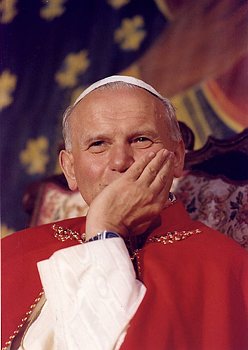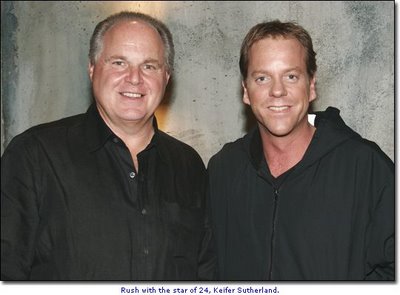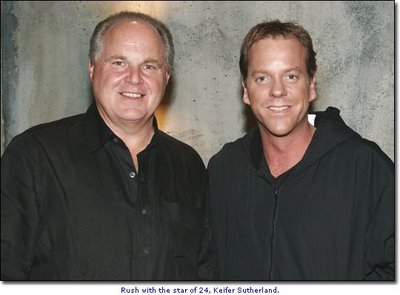A couple of years ago, my two favorite columnists were Linda Bowles (R.I.P.), Charley Reese, and Don Feder. Bowles died, and both Reese and Feder retired. This left a huge gap, which, thankfully, Ann Coulter and Mark Steyn did a lot to fill. However, in checking FrontPage Magazine recently, I learned that Feder is writing columns again. Let's check it out and see if he's up to his old form.
The Senate has reached a “compromise” on illegal immigration. Senate Majority Leader Bill Frist (who, by his conduct here, just lost the ’08 nomination) called it a “huge breakthrough” – a moral collapse would be more like it.
Did anyone ask the American people – who have time and again expressed their anger, frustration and outrage over our porous borders – whether they want a compromise on illegal immigration, on an amnesty for an estimated 12 million criminal aliens?
When asked about compromises on the more contentious issues facing the Supreme Court, Associate Justice Antonin Scalia responded: How you can reach a compromise between what the Constitution really means and what judicial activists want it to mean?
How do you split the difference between reality and fantasy – between truth and lies?
The same applies to illegal immigration.
In fact, the deal that Ted Kennedy and Harry Reid worked out with Republicans like Arlen Specter, Mel Martinez, Chuck Hagel and John McCain (the quintessential un-Republican) is no compromise at all – but a blanket amnesty for border-jumpers, whether they came seven years ago or 7 minutes ago. To claim otherwise is an insult to our intelligence.
At their press conference announcing this rape of our national identity, McCain, Specter, Reid et al. couldn’t even refer to the objects of their beneficence as illegal aliens. They were undocumented workers – the weaseliest of weasel words. Sure, and the man who breaks into my house is an uninvited guest.
Perhaps the most hilarious comments at the press conference came from stand-up comic and Senate Minority Leader Harry Reid (D, NV), who spoke of all the undocumented workers employed by
Does he think the average American actually cares about the labor costs, hence the profit-margin, of Caesar’s Palace or the MGM Grand? (Gosh, whatever would we do without a gaming industry?) If they don’t want to pay an American wage and fill those jobs with American workers, why should I care about their bottom-line?
Reid sang a different tune (which sounded more like “The Star-Spangled Banner” than “The Bonaparte’s Retreat”) in 1993, when he observed: “Our borders have overflowed with illegal immigrants placing tremendous burdens on our criminal justice system, schools and social programs. …Our federal wallet is stretched to the limit by illegal aliens getting welfare, food stamps, medical care and other benefits often without paying any taxes. … These programs were not meant to entice freeloaders and scam artists from around the world. Even worse, Americans have seen heinous crimes committed by individuals who are here illegally.”
What changed for Reid in the interim isn’t the reality of illegal immigration, but the rise of the lawbreakers’ lobby in his home state, combined with his becoming the Senate leader of the party of plunder and shameless pandering.
That master of politico-babble, Ted Kennedy, called the compromise “tough and fair,” which is like saying Chappaquiddick was a shinning example of responsible drinking and safe driving.
That the bill Kennedy helped to craft is an amnesty is indisputable. If an uninvited guest can prove he’s been here more than 5 years (from the effective date of January 7, 2004), he need do nothing to remain but pay a fine. The dictionary defines amnesty as “an act of forgiveness for past offenses, especially to a class of persons as a whole.”
By definition, coming to
The Great Compromise purports to be forgiveness for past offenses for some trespassers. Actually, it’s a blanket amnesty for all 12 million-plus illegals in the
Those who’ve resided here illegally for 2 to 5 years (from 2004) must go to one of 16 designated ports of entry and declare themselves -- as if this means anything. Then they are issued a temporary visa (that isn’t temporary at all), after which they can go home and continue their hostile occupation of American territory, and eventually apply for citizenship under the provisions of the measure.
Where the bill sorta gets tough (but only in theory) is on those who’ve been here less than two years. They are expected to depart forthwith. If they stay and are caught once, it’s a misdemeanor. Twice and it’s a felony.
How hard is it to forge a 1040-form, or a pay stub or a utility bill or a bank statement proving that Jose, who arrived here today, has been an illegal resident of the
The Senate compromise is touted as a problem-solving measure. (“Oh dear us,” its proponents wail, “We must do something to regularize all of the undocumented workers.”)
If it becomes law, it will be a major step toward solving the vexing problem of
Like the amnesties of the 1980s and the 1990s, it will result in another surge of illegal immigration. Build it, and they will come.
And those who come will have no interest in learning our language and customs, or identifying with our history and heritage. They won’t be Mexican-Americans or Haitian-Americans or hyphenated-whatevers (which would be bad enough), but Mexicans, Haitians or whatevers who happen to reside in the
They and their children, and perhaps their grandchildren, won’t assimilate but be a solvent, eroding our identity as a people, year after year, decade after decade – until, eventually,
Consider the words of Ronald F. Maxwell (writer/director of “
“What is happening on the southern border is unprecedented. Not only in our own history, but in the history of the world. No country at any time, anywhere, has sustained the influx of tens of millions of foreigners across its borders … This is invasion masquerading as immigration. It may already be too late to avoid a future annexation of the Southwest by
That congressional Democrats favor lawbreaking and national suicide is unsurprising. They are, after all, the party of the alien and the alienated – the marginal, the misfit and the criminal.
But Republicans? Some are groveling before the illegal-immigrant lobby, whilst pursuing the mirage of an Hispanic Republican vote. Others pray in the direction of Wall Street. (Corporate
In the above-quoted commentary, Maxwell addresses these words to George W. Bush: “Mr. President, this is a time for candor. Your immigration policy is viewed as captive to the cheap labor – big business lobby and inimical to the survival of our country.” And so it is.
If Republicans lose either or both Houses of Congress this year, blame on the immigration-sellout of the McCains, Specters and Hegels.
GOP strategists think Middle Americans have no place else to go in November. We don’t have to go anywhere – just stay comfortably at home.
But that will be only the beginning. The Whig Party committed suicide by refusing to take a stand on slavery. Instead, it sought accommodations with evil, like the Compromise of 1850.
Republicans are emulating their pusillanimous predecessors. The party’s conservative base – its very essence – is furious with this unpardonable betrayal.
If this gift to illegal aliens becomes law, there will be no amnesty for the Republican Party.












